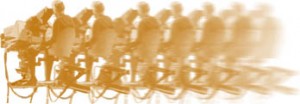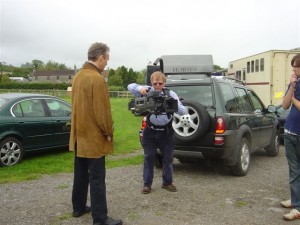My parents were ice skaters and thus show biz was in my blood. I began my BBC career as a TA at AP but it was at the moment that news was due to go to the Spur. My playing with cameras, Mk.7 Marconis ( shudder ) was about to be curtailed and the idea of actually being an ESIs 2 man seemed not the route for me or the BBC.
I ended up as a Regional TO at BBC Wales and as ‘floor crew’ tech ops. we did just about everything including radio, I even got to do engineering TA duties as I supposedly knew the hot end of a soldering iron!
My tracking experience was with, I am sure, Heron 1, anyway it was a very early model with the on/off forward and reverse hydraulic control, it was a beast but great fun on our version of TOTPs, Disc a Dawn. I thoroughly enjoyed driving this monster despite my lack of car driving licence but whether the seniors on the front did is unknown. I was always “not on the marks” until I realised that this was a way of keeping us on our toes! I had wanted to be a DoP in film a la Freddie Young so in the usual BBC way, I found myself recording and editing concerts for Radio 3 rather than in TV, later boom operating on many Welsh dramas including the pilot of Pobol Y Cwm, the longest running TV soap.
I subsequently left BBC Wales for Southern TV where I ended up as the Sound Director on the first digitally recorded (audio only) Glyndebourne Opera for Channel 4. I took the redundancy money in the late 1980s and bought two Betacam/Ikegami kits and my wife Sue and I set off for the Alps for the next 20 years making Swiss Rail Journeys with our own money. Our Swiss escapades were highly exciting including flying under motorway bridges with ‘er indoors standing on the skids of a Squirrel Heli and damn near freezing her to death outside a Jet Ranger whilst filming the railway from St. Moritz to Italy.
My BBC training was absolutely invaluable and often my TVS camera colleagues had let me ‘play’ with our ENG kit, but taking a brand new Ike and recorder to the Alps to make your own series with you funding all of it was a bit of large step. We could not see any playback, so it was like the film way that I so desired in the first place. In fact several film cameraman and DoPs trained Sue to work the Ike in a filmic way, Sue making the decision that if a shot was not executed as per cinema techniques then it was not in the show. In fact she says the best training was having to edit her own material, how true and you can see her/our progress in that the first two shows were ‘newsy’ style but the later ones were much more feature, – learning on the job, a so many of us did!
So I was back behind the viewfinder but doing the audio too, and in 2006 achieved the sought after DoP credit on a horse series; very late developer clearly and it was very weird to have senior sound and camera credits concurrently.
At the time, back at AP, being a TA seemed very much the wrong career choice but that engineering training enabled me to maintain Beta SP machines in extreme circumstances and keep ‘er indoors’ Ikegami/SP kit running when icicles were forming on our anatomy. Thank you the BBC and all my long suffering colleagues who put up with my idiot questions and callow confidence, it was the best career start available.




